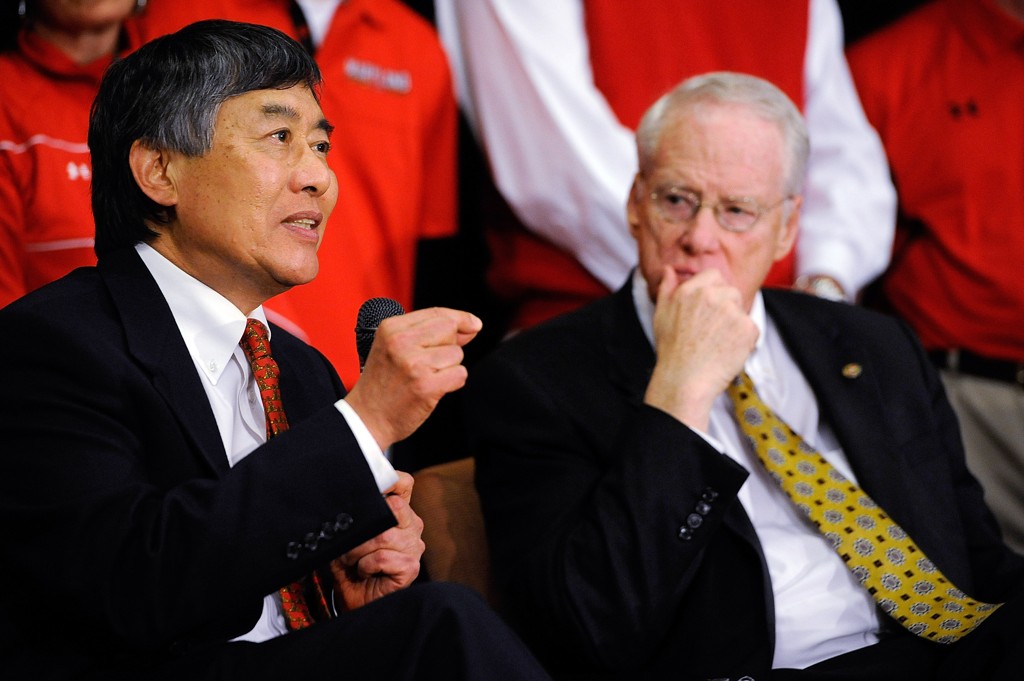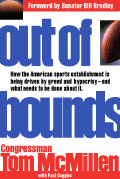Tom McMillen Rails on Decision-Making Process, Confidentiality Agreement in Washington Post Op-ed

Brit Kirwan, University System of Maryland Chancellor , looks on as University of Maryland President Wallace D. Loh speaks during a news conference announcing Maryland’s decision to join the Big Ten. (Patrick McDermott/Getty Images)
From The Washington Post
Tom McMillen, the lone dissenter during the Maryland Board of Regents’ Monday morning vote to approve the university’s move to the Big Ten Conference, expressed his issues with the discussion process in a Washington Post op-ed, expounding on a perceived lack of disclosure stemming from a confidentiality agreement signed by Maryland President Wallace Loh.
“I am on the board and I opposed this decision primarily because of the way it was made,” McMillen wrote in his second paragraph. “Most important, a change of this magnitude should not be made over a weekend, with minimal documentation, little transparency, and no input from anyone who might be opposed to it. The board did not hear from a single one of the constituencies that will be affected by this change — not the students, faculty, student-athletes or the alumni.”
According to a source familiar with the situation, the nondisclosure agreement permitted Loh to share information with people, providing flexibility to bring outside consultation into the situation. “This is completely industry-standard,” the individual said, citing television agreements with the ACC as an example of past confidentiality agreements at Maryland.
Reached by telephone, McMillen insisted that he had no objections to the final ruling, which will end Maryland’s illustrious history in the Atlantic Coast Conference on July 1, 2014, but found severe problems with a “damaging” process. Since the vote passed, McMillen has been quite outspoken about the process, telling Post columnist Mike Wise that it was “terrible.”
In his op-ed, McMillen, a former Terrapins basketball player and United States Congressman, writes that the Board of Regents were given “a single piece of paper” outlining financial figures and the general proposal upon arriving at a University of Maryland at Baltimore conference room Monday morning for the vote. The piece of paper was then taken away after the meeting.
“I get more documentation when I buy a cell phone,” McMillen wrote, a comment he reiterated Wednesday.
Last Thursday, the Board of Regents’ 16 members were notified of the proposal, and participated in a Sunday afternoon telephone call, during which Loh verbally presented the details, McMillen said. On Monday morning at 8:30 a.m., two hours before a regularly scheduled educational policy committee meeting, the regents met in secret, where they were asked to vote on the move.
“We also were told that, under the terms of that agreement, Maryland could lose the offer, and the school’s president could be held personally liable if details were divulged,” McMillen wrote in his op-ed. “Given that Maryland cannot join the Big Ten until 2014, why the big rush? The Big Ten needs Maryland in order to finalize a new TV package drawing on the Washington-Baltimore market, which is the fourth-largest in the nation. It wanted Maryland two years ago, and it will want Maryland tomorrow. There was plenty of time to build a real case for a move if it made sense.
“The real problem is that commissioners of athletic conferences can dictate terms to universities that effectively high-jack the possibility of debate, and that is just plain wrong.”
In Monday’s news conference announcing the decision, Loh admitted that the process was “pretty compressed,” but said Maryland underwent “extensive due diligence, bringing in experts to go over the financials.” Loh also said Maryland had “conversations with … 20 very, very senior people, stakeholders at this university” as well as “elected state officials.”
“There is one thing that really bothers me,” McMillen said by phone. “You’re married to someone for 60 years, and you can’t even pay them a phone call because of a confidentiality agreement. We didn’t even talk with them. They couldn’t even have a conversation with them.”
In today’s Post, colleague Mark Giannotto, citing multiple ACC officials, wrote that the conference was “blindsided” by Maryland’s decision. Commissioner John Swofford, upon hearing circulating rumors of an impending move, repeatedly tried to reach Loh, Chancellor William E. “Brit” Kirwan and athletics director Kevin Anderson over the weekend, ultimately to no avail.
In the op-ed, McMillen proposed new legislation, a “national solution” he calls the “Stakeholder Right-to-Know-Act,” which would “prohibit universities that receive federal funds from executing confidentiality agreements on behalf of their intercollegiate athletic programs, which limit information regarding transactions that should be provided to important stakeholders.” In 1990, McMillen helped sponsor a bill that required all universities to publicly disclose information such as graduation rates and campus crime.
Washington Post education writer Jenna Johnson today explored the potential illegality of the Board of Regents’ “emergency meeting.” Asked by phone if he believed the meeting was called in emergency because of an ultimatum issued by the Big Ten, McMillen could only speculate.
“The conferences shouldn’t be ruling the day,” McMillen said. “The university should be ruling the day. Give power back to the universities. Take it away to the conferences. Force them to do away with these confidentiality agreements.”








